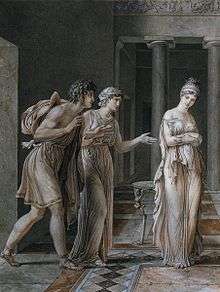Hermione (mythology)
| Hermione | |
|---|---|
|
| |
| Pronunciation | /hɜːrˈmaɪəˌniː/[1] |
| Gender | Female |
| Origin | |
| Word/name | Greek |
| Meaning | Messenger, derived from Hermes |

In Greek mythology, Hermione (Greek: Ἑρμιόνη[2]) was the only child of King Menelaus of Sparta and his wife, Helen of Troy.[3] Prior to the Trojan War, Hermione was betrothed by Tyndareus, her grandfather,[4] to Orestes. However, during the Trojan War, Menelaus promised her to Neoptolemus, also known as Pyrrhus, son of Achilles.[5] Historical sources disagree over whether such a dual promise actually occurred. For example, Euripides has Orestes say:
″Because, in fact, you were rightfully mine, from a long time ago. Your father has promised you to me before he left for Troy but then, the liar that he is, when he got to Troy, he offered you to Neoptolemos, your present husband, if he, in return captured the city″.
Ovid, though seems to confirm this earlier betrothal:
(Hermione) "Tyndareus gave me to you, he, my ancestor, heavy with experience,
and years: the grandfather decided for the grand-child.
But Menelaus, my father, made a promise of me, unaware of this act.."
This statement implying that her grandfather, Tyndareus, had betrothed her already when her father, Menelaus, then betrothed her to a new suitor, unaware of the previous promise of Hermione's hand in marriage made by her grandfather.
Regardless, ten years after the end of the Trojan War, Neoptolemus claimed Hermione as his wife. Their marriage is mentioned in Book 4 of the Odyssey, when Telemachus, son of Odysseus, visits Sparta and meets Helen and Menelaus.
Shortly after settling into the domestic life, however, conflict arose between Hermione and Andromache (widow of Hector, prince of Troy and elder brother of Paris), the concubine Neoptolemus had obtained as a prize after the sack of Troy. Hermione blamed Andromache for her inability to become pregnant, claiming that she was casting spells on her to keep her barren. She asked her father to kill Andromache while Neoptolemus was away at war, but when he chose not to go through with the murder, Hermione fled from Epirus with her cousin Orestes.
Hermione and Orestes were married, and she gave birth to his heir Tisamenus. The myths do not mention Hermione after that, though it is said that Orestes later married his half-sister Erigone, daughter of Clytemnestra and Aigisthus, who was Orestes' second cousin.
Hermione in art and literature
- Ermione by Gioachino Rossini
- Andromaque by Jean Racine
- Helen's Daughter novel by Laura Gill
- Her name may have inspired the character of Hermione, Queen of Sicily, in William Shakespeare's play The Winter's Tale. She, in turn, was the inspiration for Hermione Granger's name in the Harry Potter franchise. British actress Emma Watson portrayed Hermione in all eight of the movies.
References
| Wikimedia Commons has media related to Hermione. |
- ↑ "Hermione". Dictionary.com Unabridged. Random House. Retrieved 2016-01-22.
- ↑ Ἑρμιόνη, Georg Autenrieth, A Homeric Dictionary, on Perseus project
- ↑ Homer, Odyssey 4, 12–14
- ↑ "wise Tyndareus, a man of sober life and many long years gave me to you" — Ovid, Heroides 8. Hermione's letter to Orestes.
- ↑ Homer, Odyssey 4, 5–7
